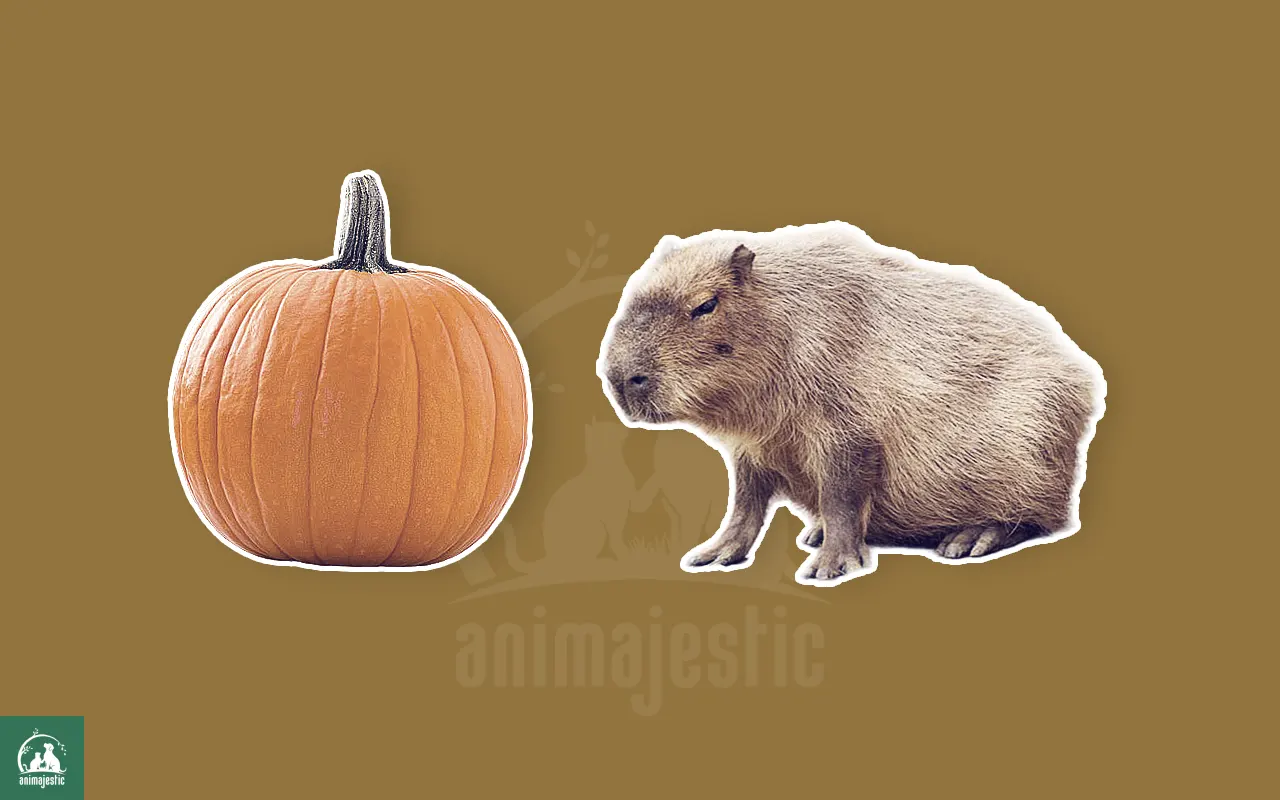Capybaras, the intriguing and adorable rodent contemporaries of the South American wetlands, never ceases to fascinate with their friendly demeanor and unique characteristics.
As the most giant living rodents on Earth, their dietary preferences pique the interests of pet owners, animal enthusiasts, and the curious alike.
So, can capybaras eat pumpkins, you may wonder? Worry not, for this comprehensive article will unravel the mystery of the capybara-pumpkin connection.
Understanding the Capybara Diet
One cannot assess the suitability of pumpkins in a capybara’s diet without first understanding the animal’s general eating habits. Capybaras are herbivores, with a primary appetite for aquatic plants, grasses, and other plant-based foods.
Their typical diet consists of:
- Grasses (both aquatic and terrestrial)
- Reeds and other water-loving plants
- Bark and woody plants
- Fruits and vegetables (in moderation)
Nutritional Requirements of Capybaras
As their dietary choices suggest, capybaras thrive on consuming foods high in fiber.
They require the following components in their meals to remain healthy, content, and vivacious:
- High fiber content: Fiber is essential for maintaining proper digestion and a healthy gastrointestinal system in capybaras.
- Moderate carbohydrates: Although they need carbs for energy, capybaras cannot indulge in excessive carbs as it can hinder their digestion.
- Essential vitamins and minerals: Just like any other creature, capybaras need a good supply of vitamins and minerals to support their overall health and well-being.
The Pumpkin Nutritional Composition
Now that we have established a capybara’s dietary needs, let’s delve into the nutritional composition of pumpkins.
Pumpkins are a type of squash, that boasts a host of impressive nutritional benefits:
- Low-calorie content: Pumpkins are low in calories, helping to maintain a healthy body weight for the animal.
- Rich in fiber: They contain an appreciable amount of dietary fiber, which aids digestion and bowel regularity.
- Potent vitamins and minerals: Pumpkins are abundant in essential vitamins and minerals, such as vitamin A, vitamin C, potassium, and iron.
Exploring the Pumpkin-Capybara Connection
With all the nutritional information, it’s time to unravel the truth behind the capybara and pumpkin liaison. Can capybaras eat pumpkins, and if so, how do pumpkins fit into their overall dietary equation?
1. Fiber content: As capybaras require a high-fiber diet, pumpkins can be a suitable addition to their menu. The fiber in pumpkins will not only promote proper digestion but also enhance their gastrointestinal health.
2. Low caloric value: With pumpkins being low in calories, they can provide capybaras with sustenance and essential nutrients without contributing to obesity or other related health issues.
3. Abundant vitamins and minerals: The liberal presence of vitamins and minerals in pumpkins satisfies the specific nutritional requirements of capybaras. These essential nutrients will help build a robust immune system and support the overall well-being of these fascinating rodents.
4. Moderation is vital: Although pumpkins are a highly nutritious food source, they should be served to capybaras in moderation and alongside their staple diet of grasses and vegetation.
Pumpkins should not become a primary food source, as they might fail to cater to all of the animal’s dietary needs and possibly compromise their health as a result.
How To Serve Pumpkins to Capybaras
To ensure that capybaras enjoy the benefits of pumpkins without experiencing any adverse effects, follow these guidelines:
- Prepare the Pumpkin Correctly: To avoid choking hazards, remove the stem, and cut the pumpkin into small, manageable pieces.
- Wash Thoroughly: Remove any pesticide residue by washing the pumpkin thoroughly before feeding it to a capybara.
- Observe Moderation: As efficient as pumpkins may be in supplementing a capybara’s diet, remember that they should not replace their primary food sources. Treat pumpkins as an occasional snack rather than part of their daily meals.
- Rotate Treats: To ensure a well-rounded diet, combine it with a diverse range of fruits and vegetables, avoiding overreliance on pumpkins.
The Pros and Cons of Capybaras Eating Pumpkins
While feeding your capybara pumpkins comes with several benefits, you should also be mindful of potential drawbacks and know how to address them.
The Rewards
- Supplementary Nutrient Source: The high nutritional value of pumpkins makes them an excellent dietary addition to capybaras. They can supplement the capybaras’ regular diet of grasses and water plants without depriving them of essential nutrients.
- Addressing Seasonal Changes: Pumpkins can serve as an alternative food source during droughts or winter months when primary food sources may be scarce.
- Provides Enrichment: Offering a variety of fruits and vegetables is crucial to ensure a well-rounded diet and prevent boredom. Introducing pumpkins into a capybara’s meal plan adds excitement and intrigue.
The Risks
- Potential Choking Hazards: When feeding a capybara pumpkin, be sure to remove the stem and cut the vegetable into manageable pieces, avoiding any sharp edges. Failing to do so might pose choking risks or damage the capybara’s oral cavity.
- Unintended Weight Gain: Although pumpkins are rich in nutrients, excessive consumption might contribute to unhealthy weight gain in capybaras. To prevent obesity, make sure to balance pumpkin treats with other dietary elements.
- Dependency on a Single Food Source: A well-rounded diet is paramount for the overall well-being of a capybara. Hence, dependency on a single food source, such as pumpkins, should be avoided.
The Verdict: Can Capybaras Eat Pumpkins?
To sum it all up, yes, capybaras can indeed eat pumpkins. When served in moderation and prepared correctly, pumpkins can be a nutritious and enjoyable treat.
They provide valuable fiber, essential vitamins, and minerals, all the while maintaining a low caloric content that ensures a healthy and balanced diet. However, keep in mind that pumpkins should not replace their natural dietary staples but instead act as supplementary nourishment.
Providing these gentle giants with a diet that is as diverse, colorful, and flavorsome as their personality is a small, yet vital, step towards improving their lives.
